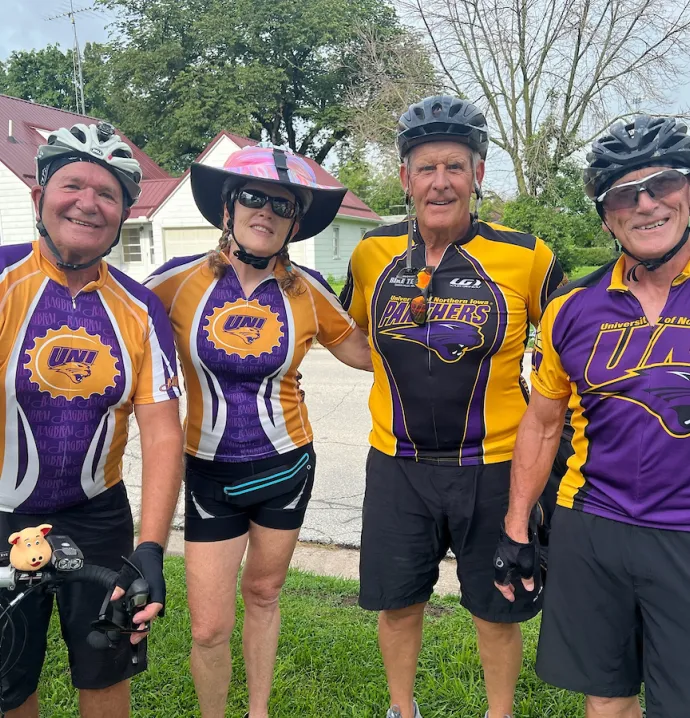Sports labor strikes in times of unrest: A conversation with David Surdam
Sports labor strikes in times of unrest: A conversation with David Surdam
When the Milwaukee Bucks refused to take the court for Game 5 of the NBA playoffs in protest of the police shooting of Jacob Blake, it sparked a wave of similar wildcat strikes across the NBA and MLB as athletes called for an end to police brutality. We asked University of Northern Iowa professor David Surdam, who has written eight books and published 18 articles on various economic issues of the NBA, NFL and MLB, to bring his decades of research to discussion about the historical precedents for the strike and the effectiveness of athlete protests to drive social change.
How often have sports leagues used the threat of a labor strike to enact social change? Is this a new phenomenon or are there historical precedents?
As far as players actually staging some sort of a wild cat strike, there was the famous incident back in 1964 in the NBA. The All-Star game was being telecast nationally. At the time the NBA was struggling for national exposure and was still certainly the third and possibly the fourth wheel of American professional team sports behind baseball, football and maybe even hockey. And so the players were disgruntled that they weren't getting a pension plan, and the owners kept stonewalling them through the commissioner. But that guy (Maurice Podoloff) died and they put in a new commissioner (J. Walter Kennedy) and the players were threatening to not play the game. And (Kennedy) came into the locker room and talked to them and made a promise that he would push the owners and the player decided, since he was new, they would give him a chance to demonstrate his goodwill. They therefore came on the court just a few minutes before the start of the game, thereby keeping the league from receiving a massive black eye (This was the first NBA All-Star game to be televised nationally. The NBA did not have a television contract at the time, and broadcaster ABC made it clear that if the game was not played, they would drop their interest in the league.).
Do you think strikes by athletes are an effective way to encourage social change?
I don't know how you go about measuring that. But I don't know of anybody who thinks that, outside of symbolism, this is really a crucial deal. I don't think players are under any illusion that they're going to affect a lot of change themselves. I think it's the way for them to demonstrate their beliefs and their frustration at what's going on. They're more effective in changing the way their industry behaves. They got free agency after a fairly long struggle and pushed for improved working conditions. Oftentimes, it was the African American players who led the resistance. So it is interesting that you have this legacy that the African American players have been more assertive in pressing for their rights.
What progress have athletes made over the years?
They got rid of the reserve clause throughout the sports, which was a legal clause in contracts that basically bound the players to a team for the duration of their professional life. You weren't allowed to go anywhere else on your own volition. They could trade you. They could cut you, they can fine you or whatever else. It’s quite exploitative.
When you look back on the history of labor strikes in sports, are they driven more by economic concerns of the players or a desire to affect social change?
I would argue it’s more of the former. Very few of the players were social rebels. Even Jackie Robinson held fairly conservative views and famously voted for Richard Nixon in the 1960s, which raised the hackles of a fair number of people. Some of the players were interested in social resistance, like Bill Russell, Kareem Abdul-Jabbar or Curt Flood. But I think a lot of the players are just like the general citizenry. They just want to live their lives, and they're more interested in how things are going to affect them and also their families.
With this most recent NBA wildcat strike, it was interesting to see the owners support the teams. Do you think that’s a new paradigm?
That’s an interesting question. I don’t know if anyone has studied that. I don’t think the NFL owners would have been on board with this, but the NBA owners were. Maybe that’s because their commissioner (Adam Silver) figured out how to use the cachet that they’re socially responsible. I was stunned in March when they pulled the plug on the season so quickly. I was figuring that’d try to stagger through the season since there was so much money on the line. So they seem to be somewhat different from the NFL, which has fumbled, to use a bad choice of words, several opportunities, especially with domestic abuse and the Washington Redskins’ team name.
Can you talk about your research? How did you get interested in using economics to study sports?
I was always interested in sports. I mostly like the numbers and history. For labor economists, they don't usually have very good productivity data. There can be two tellers in a bank, but how do you measure productivity? Is it just the number of people they serve? Whereas in professional sports, you've got these reams of numbers. And you have whole companies of people trying to delve into the numbers. So it's an interesting economic situation. We get to see how people would act if they had some sort of price-setting monopoly power and oftentimes they act rather badly. And it's fascinating to watch how it evolved. The owners we have today are very different from the owners of the past. These owners are way more wealthy than the owners of the past. For a lot of the past owners, the team was their livelihood. Whereas for today’s owners it’s just a hobby. So that may have also changed the dynamics and undoubtedly they're more educated people than they were in the past, including the players to some degree.




